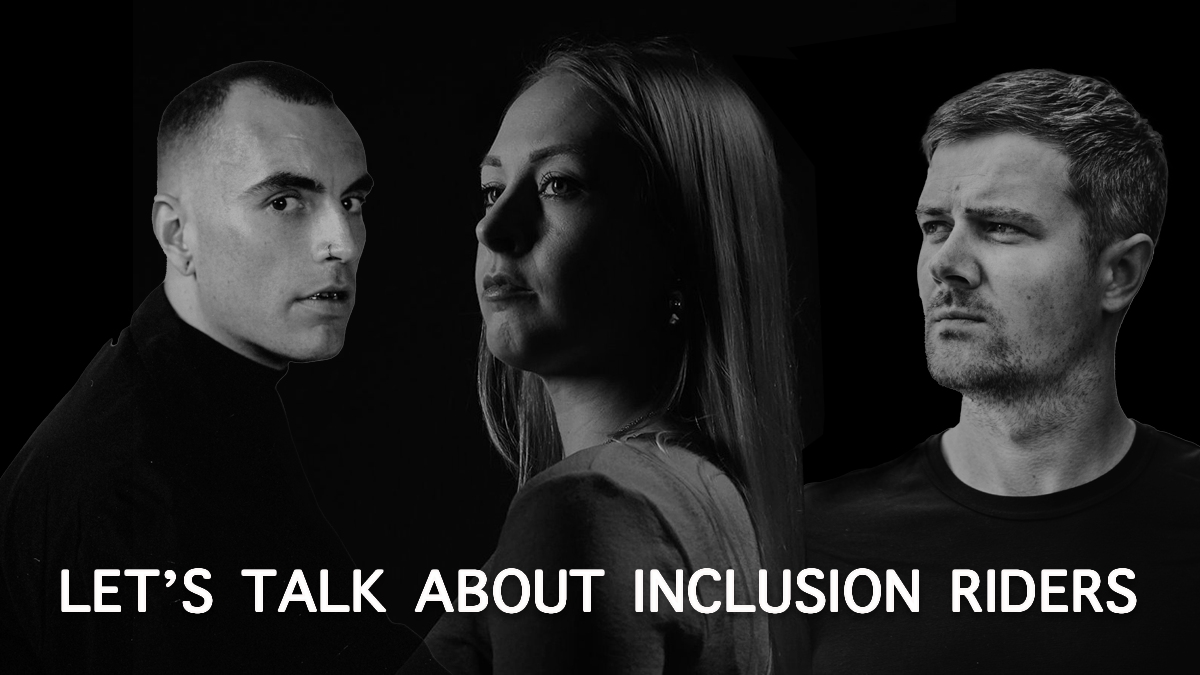Let’s Talk About Inclusion Riders


In March 2018, American actress Frances McDormand concluded her Oscars acceptance speech with two words: “Inclusion Rider.” A previously little known phrase that would go on to spark a hot debate about equality and representation in the film world. In the four years since that moment, inclusion riders have caught the attention of artists and industries far beyond Hollywood. And it’s slowly becoming more common to hear the term cropping up in bass music circles and the wider electronic music scene in general.
If you’re now already halfway through googling “what is an inclusion rider?” don’t worry, you’re far from alone. A recent survey by Pirate Studios found that only 30% of the artists they spoke to knew what inclusions riders entailed. So for those of you who fall within the other 70%, an inclusion rider is a stipulation in an artist's contract that means that they will only play on line-ups which include a certain number of diverse artists alongside themselves. The clause will typically state something along the lines of:
"The Promoter should agree to book at least one person or persons who would be defined as being a member of an under-represented group(s) in electronic music playing.
*Under-represented artists refers to people who identify themselves as women, non-binary, Black, Indigenous, people of colour, disabled, Lesbian, Gay, Bisexual, Transgender or Queer, or any combination of these identifying terms as defined by their own choice or description.”
For artists who have already adopted inclusion riders, like DnB Queen Kyrist, they’re a vital step in ensuring a push towards equality in underground music.
“As a woman in the DnB scene, I've played most events being the only one for years,” Kyrist told us. “In my late teens when I started going to raves, it was rare to see womxn behind the decks and I always wondered why that was, but it didn't make me think that I wasn't able to do it or achieve what these guys were achieving. I feel like now is the time for promoters to make a change and look outside of their safe options and big names who they know will sell tickets. Taking a chance on someone new is never going to hurt, and you could earn so much more respect from the crowd for doing so.”


For a femxle DJ like Kyrist, the understanding that something needs to be done to challenge this inequality has been there from the very beginning. But for others who are part of the majority, it’s taken time to understand their place in bringing about change. Adopting an inclusion rider was part of this journey for Alix Perez.
“The lack of diversity in our scene is something that I’ve been aware of for a long time but not something that I acted on personally enough in the past,” says Alix. “It’s been on my mind for a good while and with the guidance of some friends and mentors I was able to implement something like my booking clause that will make a small difference. If we all join together on this movement it will hopefully become a standard in our industry.”
Workforce too is in the process of implementing an inclusion rider as a result of a shift in thinking brought on by the events of 2020. “I’m happy to admit that this is a new-ish consideration for me,” he told us. “It didn't cross my mind before. That’s just me being honest. It would be pointless for me to pretend otherwise. 2020, whilst being utter shit for the most part, saw a huge push for social justice on multiple fronts - race, sexuality, gender, and more. It also allowed us, as people who work in the club music world, the time and headspace to reflect on what we have all built and to pick at the flaws and to begin to try to work out how to iron them out.”
“I don’t feel like there is a right or wrong way to go about making the changes that are needed in Electronic Music, and more broadly. But equally I don’t feel like that is an excuse to do nothing. It‘s a complex conversation. For me, I just feel like we need to normalise the idea that everyone should be thinking about the diversity of the talent they book and/ or perform alongside.”


But not everyone believes that inclusion riders are the answer to creating an equal platform for artists. As part of our research, we invited you to share your views on inclusion riders with us and one of the biggest criticisms amongst those against them was that they run the risk of becoming a tokenistic gesture.
One anonymous commenter told us, ”I think that people with talent should be given opportunities regardless, I do also think that people have to earn those opportunities though. People shouldn’t be booked to play purely because they tick a box, people should be booked to play because they have earned the right to play through talent or productions/graft." Whilst another argued, “You can't make quotas out of people. It renders the whole idea of equality laughable. The system has to be based on merit. And how patronising is the idea to include someone because you have to. Knowing this is in place, as a BAME person I’d constantly wonder if I was included because I was good enough or whether I was making up a quota.”
Whilst these fears are undeniably justified, you can’t help but feel that there must be a flaw in the system somewhere if so many talented artists from underrepresented groups are not being given the same opportunities as others as things stand.
“The thing is, I think there is this general idea that we live in a meritocracy; where the top talent will always rise to the top, no matter the ethnicity, gender or sexuality of that person/ persons,” states Workforce. “That is just demonstrably untrue. And while I can see the angle someone is coming from when they say “I just want the music to do the talking”, if we don’t do something to afford more opportunities to a more diverse selection of people by trying to have the conversation about inclusion, then nothing changes and we’re all poorer for it, in my opinion. If we can offer equality of opportunity, then we are on the right path to an actual meritocracy; not just the façade of one.”
And for Kyrist, any danger of tokenism can be removed if instead of event organisers picking DJs to tick a box, they do the work and find artists that compliment line-ups properly.
“Websites like Dynamics showcase womxn in bass music in such a way that you can narrow it down to exactly the kind of artist you're looking for in regards to what they play so that takes the tokenistic element away from it I feel,” she says. And Alix Perez will even do the work for them if required. “If promoters say they don’t know of any artists that fall in line with the clause, I will personally suggest or look for artists myself. I’ve done a lot of searching and have a list of artists I can suggest to promoters in various cities and countries. It just takes time and development but it is forever evolving and growing.”


Although Perez also recognises that this needs to go beyond one night to really work. “I think that inclusion riders sometimes can be somewhat tokenistic. Which is why I’m constantly searching for artists that align with our sound and vision at the label. It means that we can grow with these artists and have them as a permanent part of the events and record schedule. There’s a lot more longevity in that than a one off booking.”
Another issue raised in our survey was the possibility of artists losing out due to the limitations of inclusion riders. “Inclusion riders need to be led by people who are already big names, or else less well known artists will simply punish themselves/lose gigs while the same big names get booked again and again,” one person told us. Which is something that rang true for Workforce, “a small minority of promoters may choose to book another act who isn't asking these types of questions. I can’t speak for anyone else, but I can say that that is an instinctive fear for me - rightly or wrongly - and so it must play a part for others.”
But ultimately he accepts that this could be part of the process. “Something has to change,” he continues. “And the consequence of that change could be that people like me (white men) will potentially lose work to make space for others. I feel like that is kind of an irrelevant concern, particularly if staying as we are/ were comes at the cost of the exclusion and lack of opportunities for others. I respect that not everyone will agree with that sentiment or about the best way for things to progress, but that’s just my thoughts.”
Kyrist also agreed that bigger artists need to lead the way if inclusion riders are to be a success. “The changes have to come from the top and trickle down, the artists might have to sometimes put themselves on the line in order to make event organisers realise there needs to be some adaptation in order to be representative.”
There’s still a long way to go on that front given the fact that Pirate Studios found that only 7% of artists currently have an inclusion rider in place. But the fact that the conversation has started has got to be the most important thing. And it has to be said that the vast majority of comments we received about inclusion riders were extremely supportive of the initiative with the general attitude being that “everyone needs to play a part in universal change in our scene. We are all in it together.” Which is something Workforce was also keen to echo: “There is a spectrum of opinion on this, and we need to try and not allow more divisions to emerge. Fundamentally, the push for diversity and change has to be done en masse.”
One of the first DJs to speak up about inclusion riders was Om Unit. Speaking in an interview with Pirate studios, he also emphasised how inclusion riders need people to be open and willing to work together. “I think healthy discussion with promoters and keeping the lines of communication as open as possible when it gets tricky will be one way to help tackle any issues. Walking away from the show without healthy discussion should be the absolute worst case scenario.”


Again, this conversation is what’s also key for Workforce, “The main thing that I feel is important is for it to not feel punitive, but collaborative and positive - to be more of a conversation with promoters and others about the diversity of their line-ups and about the inclusion of people from minority and/or marginalised groups. I don’t feel that the responsibility should fall solely on anyone’s shoulders, but I do feel like every component of a music scene should try to play it’s part. And It should be said also that many promoters have taken it upon themselves to do this already.”
With clubs having only reopened a few weeks ago, it’s still early to tell what these conversations will look like and what the reaction to inclusion riders will be. But being out in New Zealand, Alix Perez can offer us some hope for them working, “So far, it has been well received. A lot of the promoters that I work with worldwide on a regular basis are people either already actively doing this or are aware of the lack of diversity. Having relocated to New Zealand, I’ve noticed that it is particularly progressive over here and that’s a great thing. I’ve had a couple of instances where promoters seemed to lack interest in the matter but I was able to suggest artists myself which easily solved the problem. I remained adamant that it was necessary for the booking to go ahead, which to be honest is not much of a request.”
Whatever your opinion of inclusion riders, the fact that they’ve strengthened conversations about how we achieve equality in bass music can only be a good thing. Because as Workforce says, “If we rely on the mechanisms in place now, they will continue to afford the majority of opportunities to people like myself while others are excluded or passed over, and the cycle will replicate and repeat itself. For me, this is something that we should all be excited and energised to change.”
Words: Emma Rochford

